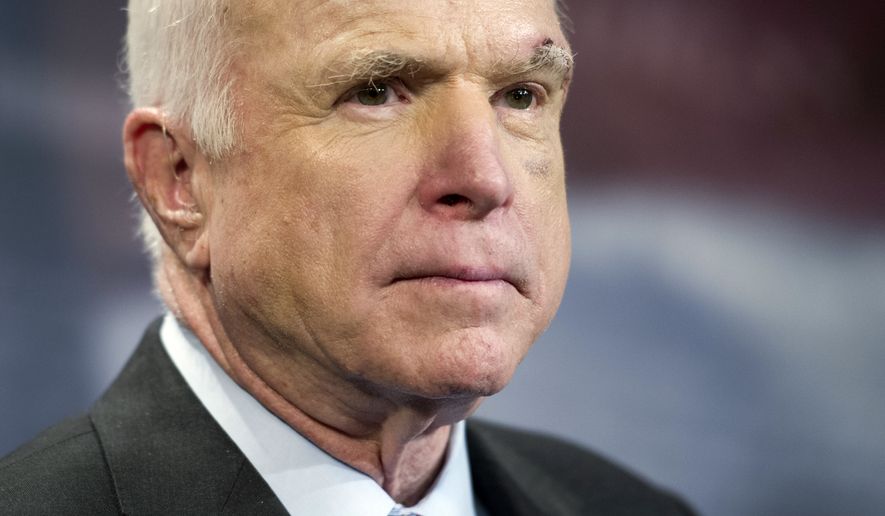Sen. John McCain of Arizona said Thursday he cannot support the GOP’s last-ditch plan to replace Obamacare, likely dooming the effort and President Trump’s pursuit of a major legislative victory.
Mr. McCain, a Republican, was among three senators who killed off the repeal effort in July, but GOP leaders hoped he would back a plan sponsored by his good pal, Sen. Lindsey Graham of South Carolina and Sen. Bill Cassidy of Louisiana.
In a statement, Mr. McCain said the plan was being rushed through without a sober analysis of its impact.
“I cannot in good conscience vote for the Graham-Cassidy proposal,” he said. “I believe we could do better working together, Republicans and Democrats, and have not yet really tried. Nor could I support it without knowing how much it will cost, how it will effect insurance premiums, and how many people will be helped or hurt by it.”
Republicans must pin down 50 votes to pass the plan before a Sept. 30 deadline to act under the 2017 budget.
Its arcane rules allow the GOP to avoid a Democratic filibuster, with Vice President Mike Pence acting as tie-breaker.
Yet Sen. Rand Paul of Kentucky has refused to back the proposal, saying it leaves too much of Obamacare in place, and Sen. Susan Collins of Maine has voiced concerns, meaning GOP leaders probably won’t be able to scrape together enough votes.
The plan isn’t dead just yet, though Mrs. Collins told Maine voters on Friday she was “leaning against the bill,” according to the Portland Press-Herald.
Sen. Lisa Murkowski of Alaska, who joined Mr. McCain and Mrs. Collins in blocking the July effort, is also a hard sell for GOP leaders.
Bill sponsors had exuded confidence in recent days, saying they were getting closer by the day to pinning down needed support, and Senate Majority Leader Mitch McConnell announced he planned to bring the bill to the floor.
But Mr. McCain said his colleagues were emphasizing next week’s deadline over thoughtful reforms.
“I would consider supporting legislation similar to that offered by my friends Senators Graham and [Bill] Cassidy were it the product of extensive hearings, debate and amendment,” he said. “But that has not been the case. Instead, the specter of September 30th budget reconciliation deadline has hung over this entire process.”
The wily Senate “maverick,” who is being treated for brain cancer, said Democrats made the same mistake when they muscled through the Affordable Care Act without support from a single Republican.
If Republicans follow suit, he warned, “our success could be as short-lived as theirs when the political winds shift, as they regularly do.”
Under the Graham-Cassidy bill, Obamacare money that pays for Obamacare’s expansion of Medicaid and that subsidizes coverage for many of those who buy insurance on the exchanges would be pooled and instead given to states as block grants. The states would tailor the money to their own health care plans starting in 2020.
The plan repealed the most unpopular part of Obamacare — the individual mandate requiring Americans to hold insurance or pay a tax. States could restore the mandate or find another spur to get people covered.
Mr. McCain’s home-state governor, Doug Ducey, backed the plan earlier this week, but at least six GOP governors balked, saying it would slash funding to their states through 2026.
Democrats, who increasingly feared their defense of Obamacare has run out of gas, reacted to Mr. McCain’s decision with glee.
“Good news: 1:50 PM Eastern time, Senator John McCain thumbs down on Graham-Cassidy!” House Minority Leader Nancy Pelosi wrote to colleagues.
Mr. McCain, meanwhile, stressed he took no pleasure in opposing his colleagues’ plans.
“Far from it. The bill’s authors are my dear friends, and I think the world of them. I know they are acting consistently with their beliefs and sense of what is best for the country. So am I,” he said. “I hope that in the months ahead, we can join with colleagues on both sides of the aisle to arrive at a compromise solution that is acceptable to most of us, and serves the interests of Americans as best we can.”
Mr. Graham said his friendship with Mr. McCain is based on how he’s lived his life — not the votes he takes — but that he “respectfully disagrees” with the Arizonan.
“We press on,” Mr. Graham said.
The Senate Finance Committee is scheduled to hold a hearing on the bill Monday. Also, the Congressional Budget Office is expected to release top-line numbers on how the plan would affect spending, though a comprehensive analysis isn’t expected for weeks.
The Senate Health Committee had been working on a bipartisan bill to stabilize the individual insurance market before Obamacare enrollment begins Nov. 1. Insurers are supposed to ink contracts to participate in the marketplace before the end of the month.
But Chairman Lamar Alexander, Tennessee Republican, said the effort stalled out this past week amid the hysteria around “Graham-Cassidy” and a Democratic push for government-run, single-payer health care.
He said negotiators couldn’t strike a balance between state flexibility under Obamacare — something Republicans want — and funding for “cost-sharing” payments that Mr. Trump has threatened to withhold.
The potential collapse of the GOP push, coupled with Mr. Trump’s ambivalence toward his predecessor’s signature program, leaves the insurance markets in limbo.
Sen. Patty Murray, Washington Democrat who’d been working with Mr. Alexander, said on Twitter she is “at the table” and ready to pick up where they’d left off, “as soon as this latest partisan approach is set aside.”
A poll released Friday says Americans favor Obamacare over the Graham-Cassidy plan, 56-33 percent.
The ABC News/Washington Post poll found 42 percent “strongly” favor the 2010 law, nearly twice the 22 percent who feel strongly about the GOP plan.
A quarter of Republicans — 23 percent — and a third of conservatives (31 percent) preferred Obamacare to the last-ditch plan.
• Tom Howell Jr. can be reached at thowell@washingtontimes.com.




Please read our comment policy before commenting.